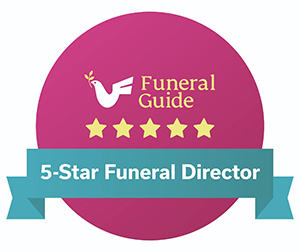The loss of a loved one is a traumatic and stressful time. When it comes to planning the funeral, writing a eulogy can bring up a whole mix of emotions. You may wonder, ‘has this been written correctly?’ or ‘have I missed anything?’. We’re here to help make writing a eulogy a little easier at a difficult time.
This week, here at S. Stibbards & Sons, we’ve created a blog post to help you write a eulogy for your loved one. In 7 steps, we’ll walk you through the eulogy writing process.
Here are 7 steps of writing a eulogy.
The 7 Steps of Writing a Eulogy
1. Deciding on the Tone
When writers create work, they always set a certain tone. The same goes for eulogies; there needs to be a proper tone. Whilst there is no ‘right tone’, it’s largely dependent on the person you are honouring in your eulogy. Some people opt for a serious tone and some for a lighter-hearted one. It’s more about capturing the tone of your loved one then writing in a way that is for you. For example, if your loved one was a humorous person, maybe a light-hearted tone would be suited to their eulogy.
It’s not to say that a eulogy can’t be both light and serious but capturing the tone that reflects your loved one can be an easier way to help you craft your eulogy. Tone can also be circumstantial, as it’s dependent on the situation. An unexpected death may warrant a more serious tone, but it’s about creating the right tribute for your loved one. So, decide on a tone that honours them and their life.
2. Consider the Audience
One thing to remember when you’re writing your eulogy is that you may not be familiar with everyone that’s attending the funeral service. There may be distant friends or relatives that you will not recognise attending, so making sure that your eulogy is created with the audience in mind is essential. By this, we mean any anecdotes or stories you tell must be explained with context, so those unfamiliar with who you are in relation to the deceased, will not be left confused. Remember, it’s important to be sensitive to the audience, especially at this difficult time. Always keep the audience in mind when composing your tribute.
3. Introduce Yourself
Returning back to the point about the audience being unfamiliar with who you are, it’s essential that you introduce yourself. Who you are in relation to the deceased is important, so make sure you include it in your eulogy – albeit briefly.
4. Information about your Loved One
By no means should it be similar to an obituary but speaking about key moments in the life of your loved is a nice touch. Mention their family life, career, interests, hobbies alongside your own anecdotes and stories. It’s an added touch that may be appreciated by the audience.
5. Their Qualities
Speaking about the qualities of your loved one is an excellent thing to include in your tribute. However, simply listing off that they were ‘kind, generous’ etc. is not always the best way to talk about their qualities. It might be nice to include examples of their qualities, stories behind their generosity for example. This can help breathe life into old memories and provide the audience with a fully painted picture of their qualities.
6. Be Concise
Funeral services are usually limited in time. So, when it comes to your eulogy it’s ideal to keep it concise. The average eulogy is around 3-5 minutes, but dependent on how the service will run, you may have more time. It’s important to try and keep your tribute within time restraints, but don’t miss out anything you feel important. That’s why planning your eulogy and what you want to include can help you write concisely.
7. Seek Advice from Others
Finishing your eulogy may not be the end. It’s always a good idea to get someone to glance over it and give you their opinion. They can make sure it’s appropriate, concise and not to specific that those attending, who may not know you well, would be alienated from the content. Ideally, you should ask someone who knows your loved one to check over. Whilst grammar and spelling don’t need to be perfect, as it will be read out loud, a second glance can be beneficial.
There’s no ‘right way’ to create your eulogy. Hopefully, these steps will provide you with the framework to craft your tribute, but ultimately, your eulogy should honour your loved one and be for the audience.
For help and advice throughout the funeral planning process, you can speak to us at any time. S. Stibbards & Sons are here to support you throughout this difficult time.







